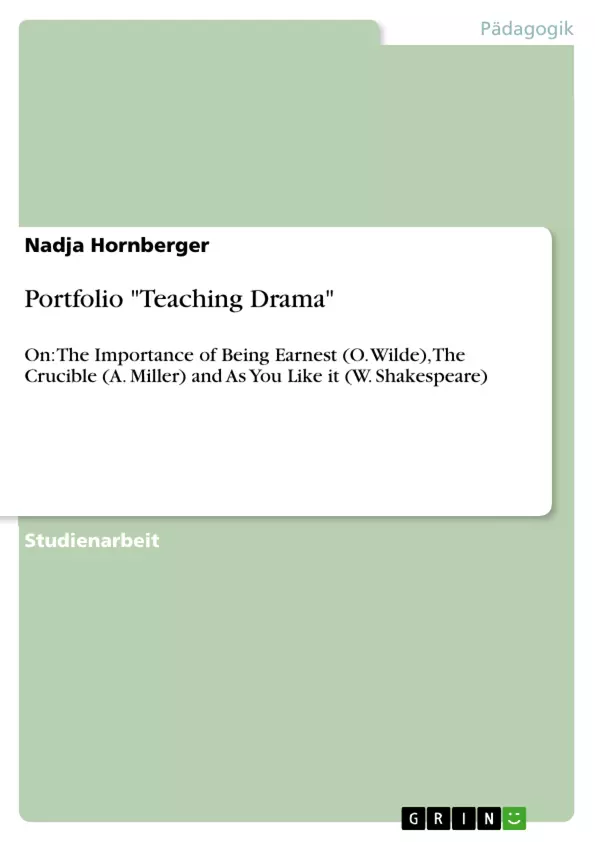Das Portfolio bildet eine Hausarbeit in Begleitung zum Seminar "Teaching Drama" und beschäftigt sich mit den drei genannten Dramen, insbesondere auch mit Teaching Ideas dazu.
Inhaltsverzeichnis
- Part A
- Oscar Wilde - A biography about a moving life in note form
- Plot
- Setting
- Structure
- Fictional characters
- Themes in the play and quotes which underline them
- Ideas how to teach this text
- Part B: Why teach plays?
- Part C
- Biography of Tituba
- Film review
- Part D
- Why teach Shakespeare and why the play 'As You Like It?'
- The author
- About the play
- The characters and their relations
- Analysis of the play
- Teaching ideas
- Conclusion
Zielsetzung und Themenschwerpunkte
Dieses Portfolio befasst sich mit der pädagogischen Nutzung von Theaterstücken, insbesondere "The Importance of Being Earnest" von Oscar Wilde, "The Crucible" von Arthur Miller und "As You Like It" von William Shakespeare. Das Portfolio beleuchtet die Biografien der Autoren, analysiert die Plots, Settings, Strukturen, Charaktere und Themen der Stücke. Zudem werden didaktische Ansätze für den Unterricht der jeweiligen Werke erörtert und die Relevanz von Theater im pädagogischen Kontext beleuchtet.
- Die Bedeutung von Humor und Ironie in Oscar Wildes "The Importance of Being Earnest"
- Die Darstellung von gesellschaftlichen Konventionen und Doppelmoral in "The Importance of Being Earnest"
- Die Relevanz von Shakespeare für den heutigen Unterricht und die Analyse des Stücks "As You Like It"
- Die Erörterung der Beziehungen zwischen den Charakteren in "As You Like It"
- Die Verwendung von Theaterstücken als didaktische Werkzeuge zur Förderung von Kreativität, kritischem Denken und Kommunikation.
Zusammenfassung der Kapitel
Part A
Oscar Wilde - A biography about a moving life in note form
Dieser Abschnitt bietet eine kurze Biographie von Oscar Wilde, die seine Lebensgeschichte in Stichpunkten zusammenfasst. Er betont Wildes Humor und seine stilvolle Persönlichkeit sowie seine homosexuelle Orientierung, die in seiner Zeit zu einem Skandal führte.
Plot
Der Plot von "The Importance of Being Earnest" wird zusammengefasst, wobei die zentralen Charaktere John Worthing, Algernon Moncrieff, Gwendolen Fairfax und Cecily Cardew vorgestellt werden. Es wird auch die Rolle des „Bunburyismus“ und der Namensverwirrung hervorgehoben.
Setting
Dieser Abschnitt beschreibt das Setting des Stücks, das in den 1890er Jahren in London und Hertfordshire spielt. Die Atmosphäre des Stücks wird als ironisch und sarkastisch beschrieben, wobei die triviale Oberklasse Londons satirisch dargestellt wird.
Structure
Die Struktur des Stücks wird erklärt, die in drei Akte mit jeweils zwei Teilen gegliedert ist. Die einzelnen Akte und Teile werden mit kurzen Beschreibungen ihrer Handlungsschwerpunkte versehen.
Fictional characters
Die wichtigsten Figuren des Stücks werden vorgestellt, darunter John (Jack/Ernest) Worthing, Algernon Moncrieff, Gwendolen Fairfax, Cecily Cardew, Lady Bracknell, Miss Prism und Reverend Canon Chasuble. Zu jedem Charakter werden kurze Beschreibungen und Informationen über ihre Rolle im Stück gegeben.
Part D
Why teach Shakespeare and why the play 'As You Like It?'
Dieser Abschnitt behandelt die Bedeutung des Unterrichts von Shakespeare und insbesondere des Stücks "As You Like It". Die Relevanz und die Vorteile der Auseinandersetzung mit Shakespeare im Unterricht werden beleuchtet.
The author
Hier wird eine kurze Biographie von William Shakespeare gegeben, die seine Lebensgeschichte und seine Bedeutung als Dichter und Dramatiker zusammenfasst.
About the play
Dieser Abschnitt bietet eine kurze Zusammenfassung des Stücks "As You Like It". Er beleuchtet die Thematik des Stücks und seine zentrale Botschaft.
The characters and their relations
Die wichtigsten Charaktere des Stücks werden vorgestellt und ihre Beziehungen zueinander werden erläutert. Die Bedeutung dieser Beziehungen für die Handlung und die Botschaft des Stücks wird hervorgehoben.
Analysis of the play
Dieser Abschnitt analysiert die Thematik und die Botschaft des Stücks. Es werden die wichtigsten Elemente des Stücks und ihre Bedeutung für die Gesamthandlung und die Interpretation des Stücks erörtert.
Teaching ideas
Dieser Abschnitt präsentiert Ideen und Ansätze, wie das Stück "As You Like It" im Unterricht behandelt werden kann. Es werden didaktische Methoden und Aktivitäten vorgeschlagen, die die Schüler aktiv in den Unterricht einbeziehen.
Schlüsselwörter
Das Portfolio behandelt die Themen Theaterpädagogik, Dramenanalyse, Humoristische Dramen, Gesellschaftliche Konventionen, Doppelmoral, Shakespeare, "As You Like It", Charakteranalyse, Didaktische Ansätze, Unterrichtsgestaltung, und Kreativität.
Häufig gestellte Fragen
Warum sollte man Theaterstücke im Unterricht behandeln?
Theater fördert Kreativität, kritisches Denken und Kommunikation und bietet Schülern die Möglichkeit, komplexe gesellschaftliche Themen aktiv zu erarbeiten.
Welche Themen werden in "The Importance of Being Earnest" analysiert?
Zentrale Themen sind Humor, Ironie, die Doppelmoral der Londoner Oberklasse sowie die satirische Darstellung gesellschaftlicher Konventionen.
Ist Shakespeare heute noch für Schüler relevant?
Ja, das Portfolio zeigt am Beispiel von "As You Like It", wie zeitlose Themen wie Identität und Beziehungen durch moderne didaktische Ansätze vermittelt werden können.
Was ist "Bunburyismus" bei Oscar Wilde?
Es ist das Erfinden einer fiktiven Person, um sich unangenehmen sozialen Verpflichtungen zu entziehen, ein zentrales Motiv in Wildes Komödie.
Welche "Teaching Ideas" bietet das Portfolio?
Es werden kreative Methoden wie Rollenspiele, Charakteranalysen und Filmvergleiche (z.B. zu "The Crucible") für den Dramenunterricht vorgeschlagen.
- Citar trabajo
- Nadja Hornberger (Autor), 2009, Portfolio "Teaching Drama", Múnich, GRIN Verlag, https://www.grin.com/document/145681



